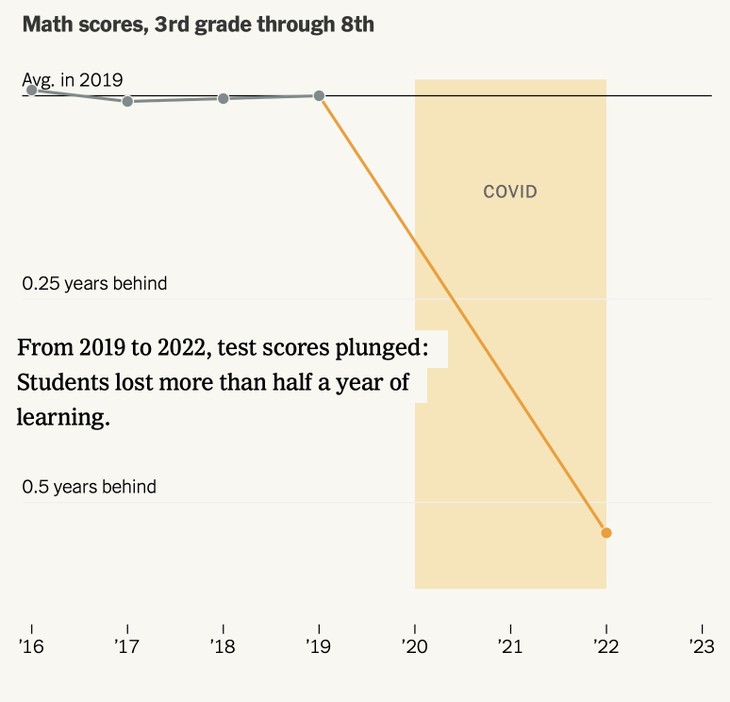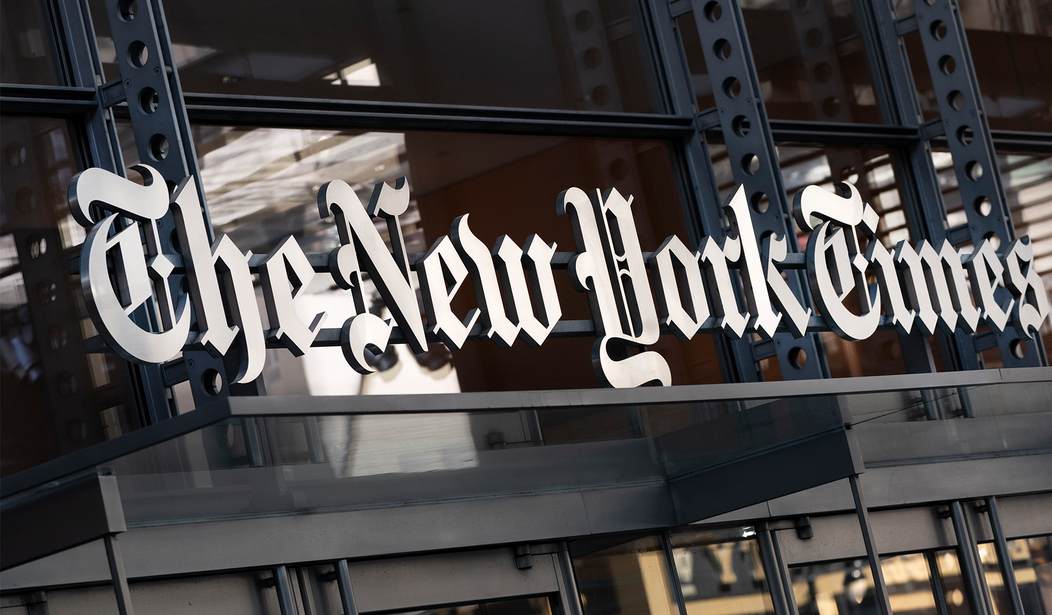The devastating impact of pandemic-era policies on kids’ educations is too great to ignore, although school districts are doing everything they can to hide it by lowering standards and dropping tests altogether.
The New York Times’ Editorial Board member Brent Staples has a short piece on their blog The Point, that touches on this point: time is running out to do anything about the disaster, if there ever was any time available to reverse the damage in the first place.
The New York times perpetuated school closure with inaccurate articles about risk to kids and inaccurate claims that closure protected adults. Now the paper is full of stories about how bad a decision it was. Why not an apology? pic.twitter.com/dnVHYbbXUx
— Vinay Prasad MD MPH (@VPrasadMDMPH) February 1, 2024
Staples’ short acknowledgment of the problem is mildly refreshing, but as Dr. Prasad points out, it obscures the fact that The New York Times bears a considerable amount of responsibility for creating this problem in the first place. One can reasonably argue that fixing the problem is more important than assigning blame–and for the society as a whole, that is certainly true. However, one can argue that fixing blame is almost as vital given that it goes to the very people who are making recommendations for addressing the issue.

The problem of learning loss itself is impossible to overstate. American children already get a pretty bad education, and with increasing ideological focus in the classroom, that problem is bad enough. Kids can’t afford to fall behind, and that is especially true for the kids who have been damaged the most–those whom we classify as “underprivileged.”
I am not a huge fan of the term, but don’t really have a good alternative, so I will use it.
These kids come from families with neither the resources to seek tutoring nor the academic focus from the parents to push their kids to catch up. Middle- and upper-middle-class parents will generally push their kids and provide resources to ensure a decent education even without great schools–at least, this is true for many of them.
But this is less true as a rule for “underprivileged” kids whose home environment is less focused on academic achievement, and in most cases where parents didn’t get a great education themselves.
Low-income school children who suffered catastrophic learning losses while schools were shuttered during the pandemic will never catch up — and will see their life chances greatly diminished — unless federal, state, and local governments develop a sense of urgency about aiding them. That message comes through very clearly in a new analysis of standardized test performance led by researchers at Stanford and Harvard.
The analysis considered test data for students in third through eighth grades in 30 states. Examining test score declines from 2019 to 2022 and recovery data as of spring of 2023, researchers were pleasantly surprised to find some improvement. But as my Times colleagues reported today, the poor students who fell furthest behind have not improved nearly enough and “are at a greater disadvantage today than they were five years ago.”
Professor Sean F. Reardon of Stanford worries that “inequality is getting baked in.” Similarly, Thomas J. Kane of Harvard warns that most states are on a path that will for force “poor children to foot the bill for the pandemic.”
I am often skeptical of arguments that focus too heavily on “inequality,” but in this case, I am the opposite. I think the problem in education is, if anything, understated, even if I also believe that the establishment solutions to the achievement gap are totally wrong.
The single best thing we can do as a society to address inequality of outcomes and the problems that come with it is to improve the educational outcomes of underprivileged kids. Affirmative action and DEI programs don’t address the underlying problem, which is not that equality of outcomes doesn’t exist. They, if anything, exacerbate the problem by emphasizing that without help, they often wouldn’t succeed on their own.
It is educational and cultural disparities that explain this fact, not racism. Affirmative action and DEI increase racism, as others question the genuine achievements of minorities because, well, who wouldn’t in a situation where we know that professional attainments are often based on race? You simply can’t know if somebody deserved a promotion because they are good at their job, or that they got it due to racial factors.
It is for this reason that conservatives strongly oppose affirmative action and scream to the high heavens about closing the achievement gap. As a practical matter, liberals do the opposite. They oppose policies that would improve educational outcomes and want affirmative action to take up the slack.
And no, raising teachers’ salaries doesn’t improve outcomes for kids. The appropriate salary for teachers is a separate issue. Paying the same teacher more money doesn’t magically improve their performance.
It is in this context that liberals’ finally noticing that pandemic policies deeply harmed kids is not enough; they must acknowledge their own policy failures and collaborate with those of us who want to fix the problems that liberals cause. They should take the back seat, allowing the people who were right about these issues to do what we can to reverse the damage.
They never will, though, because maintaining their power is far more important to them than children’s educational attainment, accountability, or any of the things that would benefit from the Establishment’s acknowledgment that they were wrong. There can be no reconciliation without first admitting the truth, and the truth is that the Establishment destroyed much that was good during the pandemic and deeply harmed the country.
The entire Establishment is following the Fauci Formula: when you screw up big time, distract and dissemble. Fauci did this with the lab leak, for which he bears tremendous responsibility. He went into overdrive to cover up this fact and has been distracting us from his disastrous mistakes by any means necessary.
The same is happening with the enormous social costs of pandemic policies. The Establishment is covering up its responsibility and doing everything it can to prevent a discussion of their mistakes.
As long as this is the case, nobody sane will trust them. And because they have the power, nothing will be done to fix the problems they caused.








Join the conversation as a VIP Member